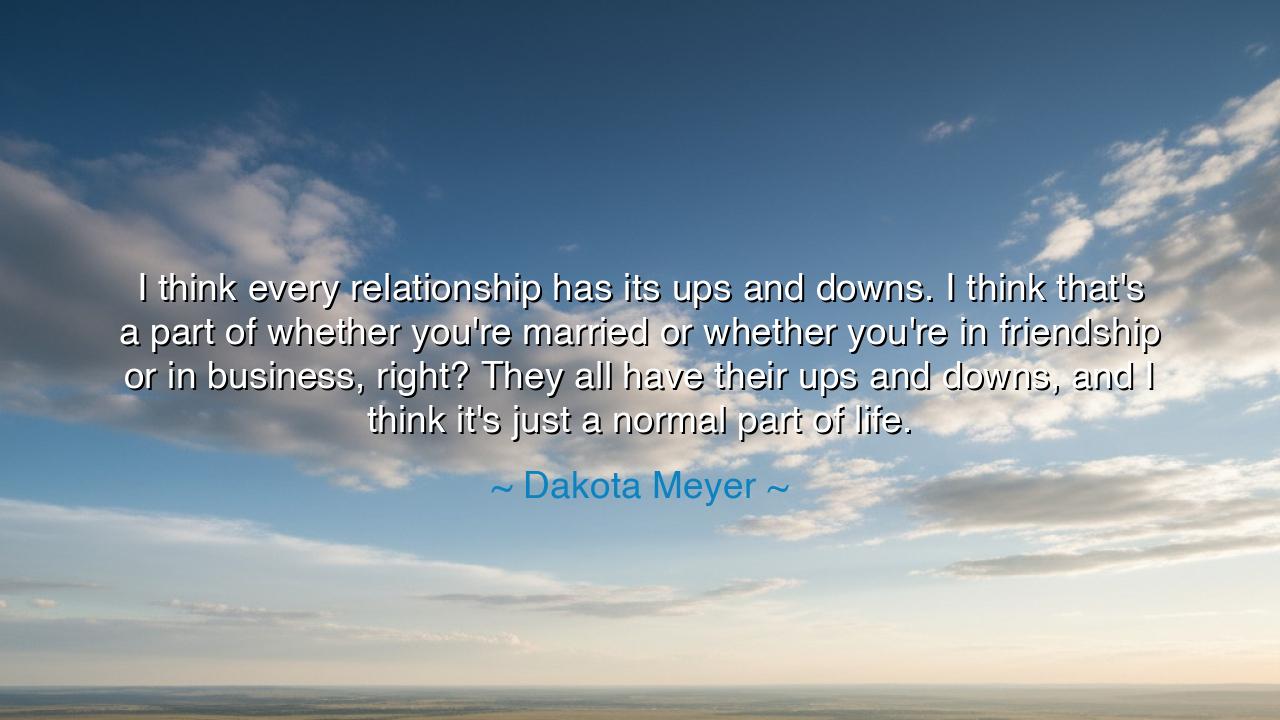
I think every relationship has its ups and downs. I think that's
I think every relationship has its ups and downs. I think that's a part of whether you're married or whether you're in friendship or in business, right? They all have their ups and downs, and I think it's just a normal part of life.






The decorated U.S. Marine and Medal of Honor recipient Dakota Meyer once said: “I think every relationship has its ups and downs. I think that's a part of whether you're married or whether you're in friendship or in business, right? They all have their ups and downs, and I think it's just a normal part of life.” Though spoken in simple language, these words carry the weight of experience and the quiet strength of a man who has seen both the best and worst of human nature. Beneath them lies an ancient truth: that struggle and harmony are not opposites, but companions, and that to live is to accept the rhythm of both rise and fall.
The meaning of Meyer’s words is not confined to love or marriage alone; it stretches across every bond that connects one soul to another. In friendship, as in business, in families and in nations, there will always be moments of conflict and misunderstanding. Yet these moments are not signs of failure—they are the growing pains of connection. A relationship without struggle is like a tree that never bends in the wind: it may appear steady, but it is brittle at the core. True strength lies in endurance, in the ability to weather storms together and emerge wiser, not weaker. Meyer reminds us that adversity does not destroy the bond—it tests and purifies it.
The origin of this truth is as old as the human heart itself. The ancients taught that all things in life move in cycles—night follows day, winter follows summer, sorrow follows joy, and then joy returns again. The philosopher Heraclitus wrote that “strife is justice,” meaning that even conflict serves a divine order, keeping the world in balance. In this way, Meyer’s reflection is not just personal wisdom, but a continuation of timeless thought: that life’s harmony is born not of perfection, but of resilience. Relationships, like the tides, ebb and flow. To love or to partner with another is to accept this motion, to recognize that even pain is part of the music of existence.
History offers countless examples of this rhythm between unity and discord. Consider the story of Abraham Lincoln and his cabinet, famously known as a “team of rivals.” Lincoln surrounded himself with men who disagreed with him fiercely, yet through patience, humility, and respect, he turned conflict into progress. Their “ups and downs” were constant, but they forged unity through struggle—and together, they preserved a nation. So too, in the life of Nelson Mandela, who endured betrayal and division yet refused to surrender to bitterness, choosing instead to build bridges where others sought walls. Their lives echo Meyer’s wisdom: that conflict, endured with courage, can give birth to greatness.
Meyer’s words also carry the humility of a man who understands imperfection. He does not speak as an idealist, but as one who has learned through the battlefield of both war and life that no bond can remain untouched by hardship. Whether between soldiers, friends, or spouses, trust must be renewed, compassion must be practiced, and forgiveness must be chosen again and again. Relationships are living things—they require effort and grace, the willingness to stay when it is easier to walk away, and the strength to listen when the heart wishes only to speak.
There is a deep emotional wisdom in acknowledging that “ups and downs” are not the enemy of love, but its teacher. Just as the sculptor’s chisel refines the stone, so too do trials refine the bond between people. Without difficulty, we remain shallow; without reconciliation, we remain proud. When we embrace life’s fluctuations instead of fearing them, we learn patience, humility, and gratitude. Each fall becomes a lesson in empathy; each rise becomes a celebration of endurance. Meyer’s insight reminds us that the path of relationships is not linear—it is a spiral that brings us, again and again, closer to understanding ourselves and others.
The lesson we must draw from his words is both practical and profound: do not despair when relationships falter, for their faltering is a sign of their depth. When conflict comes, meet it not with fear but with curiosity. Ask what it has to teach you. Practice forgiveness as an act of strength, not submission. Communicate even when it feels uncomfortable, for silence is the seed of distance. And above all, remember that relationships are not meant to be perfect—they are meant to be real, and it is through imperfection that they become holy.
So let Dakota Meyer’s reflection stand as a guiding principle for all who walk the path of human connection: life’s bonds are forged not in ease, but in endurance. The fire of adversity does not consume love—it purifies it. Friendship, marriage, or partnership—whatever its form—must be tended like a sacred flame, with patience and humility. And when storms rise, remember: the waves do not destroy the sea; they remind it of its power.






AAdministratorAdministrator
Welcome, honored guests. Please leave a comment, we will respond soon